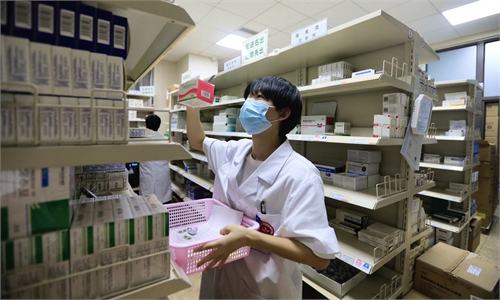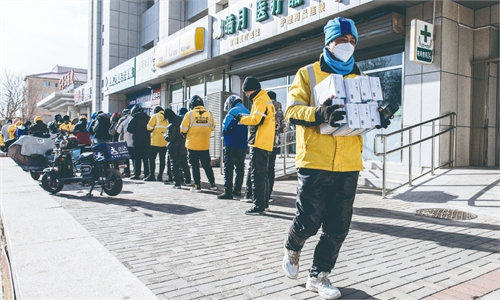Leading respiratory expert predicts Beijing facing spike in severe COVID-19 cases over coming fortnight, urges city to expand ICUs

People line at a drug store in Beijing on December 8, 2022. Photo: VCG
Beijing may experience a spike in severe COVID-19 cases over the next fortnight, a leading Chinese respiratory expert warned, urging medical institutions to expand intensive care units (ICUs) and boost medical resources to address the impending wave of infections.
Engulfed by the latest wave, medical resources in the capital city are facing additional stress. The city is set to soon face peak caseload, Wang Guangfa, a respiratory expert from Peking University First Hospital, told the Global Times on Tuesday.
Wang said ensuring there is no breakdown in medical resources is a key factor in raising success rates in treating critical COVID-19 cases.
Cases driven by the BF.7 strain in Beijing are mainly symptomatic which often triggers high fever and other extreme symptoms. Because of the difference in climate, the proportion of severe cases in the southern part of the country may not be as high as those in northern China, but that's not an excuse to taking a 'hope for the best' mentality, Wang said. "We must act quickly and prepare fever clinics, emergency and severe treatment resources."
Wang said that the primary action for hospitals is to expand ICU beds. The National Health Commission has already issued requirements - public hospitals should expand the ICU to four percent of the total beds and convert another four percent of total beds to ICU beds.
Meanwhile, hospitals should ensure sufficient treatment facilities and mobilize them through centralized management to boost efficiency, including ventilators, Wang said.
He also suggested establishing a mixed formation composing of doctors and nurses with experience in critical cases to ensure at least one competent person in each team to carry out emergency medical response. Each ICU bed should be linked to a competent doctor and 2.5 to 3 nurses capable of treating critical cases.
Wang highlighted the urgency of establishing a hierarchical diagnosis and treatment system. Low risk patients are advised to remain at home to recover, while high risk cases no matter they develop symptoms or not should report to a hospital.
Wang said the COVID-19 peak across the country will last till the end of Spring Festival which will fall on January 22 and that life would gradually return to normal around the end of February and the beginning of March.
However, following the COVID-19 peak, people should still not let their guard down, Wang warned.
"The current COVID-19 strain may be less virulent, but it may not go the same way on animals. Maybe it seems less severe for animals, but at some point, the virus can still jump to humans, with dire consequences."
Wang cited avian influenza as an example. Avian influenza or the H5N1 has few symptoms when presented in waterfowl, but when transmitted to humans, it has a fatality rate of 50-60 percent, he said. Wang suggested monitoring for the presence of COVID-19 among animals to ensure earlier warning signs are detected.
The expert suggested people continue to wear masks until the warmer months, as winter is a peak season for influenza and other respiratory viruses.
COVID-19 is a respiratory infectious disease that mainly affects the respiratory system and may lead to severe pneumonia, respiratory failure, acute respiratory distress syndrome. Winter is also a high season for cardiovascular and cerebrovascular diseases, Wang added.




